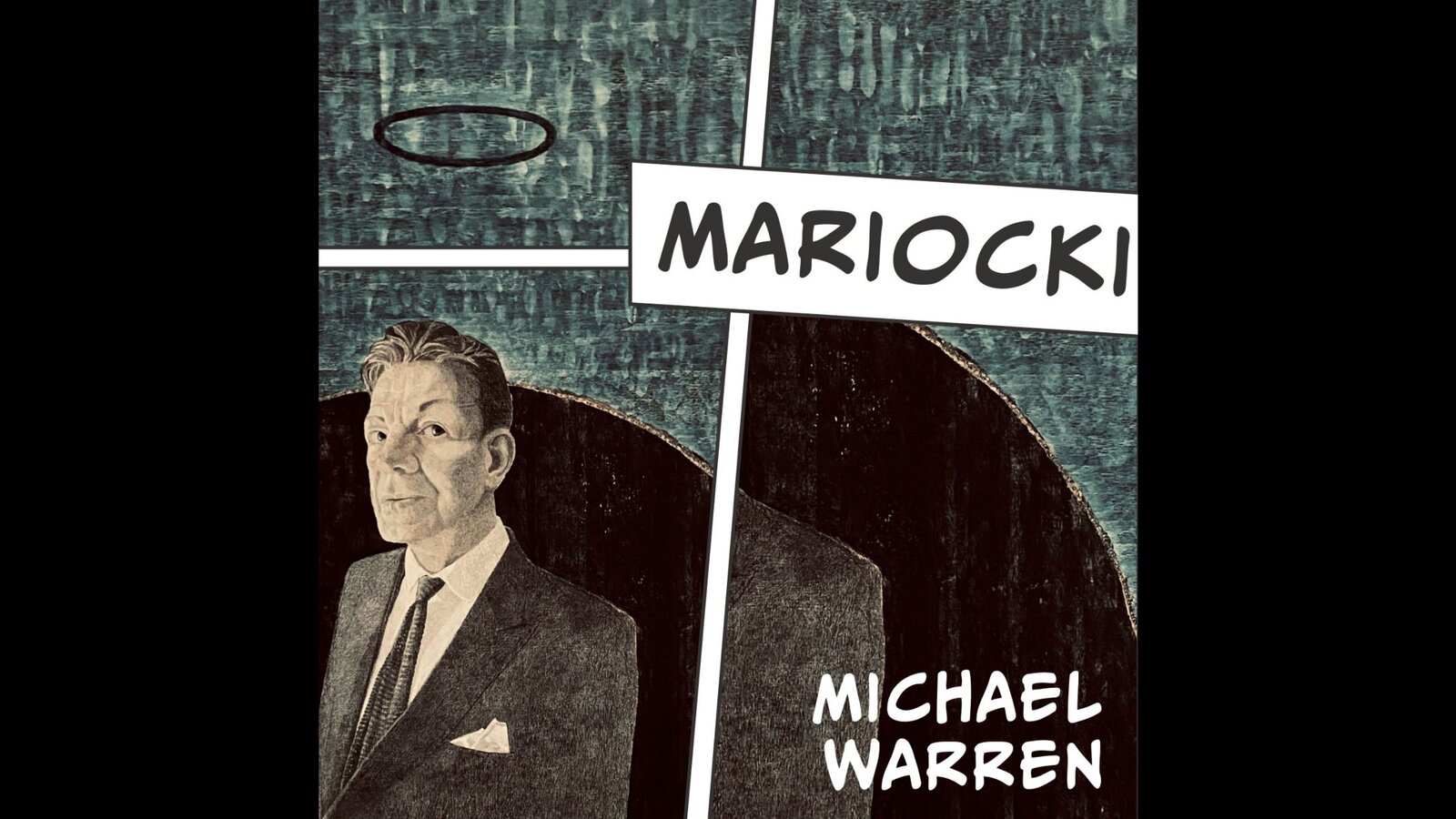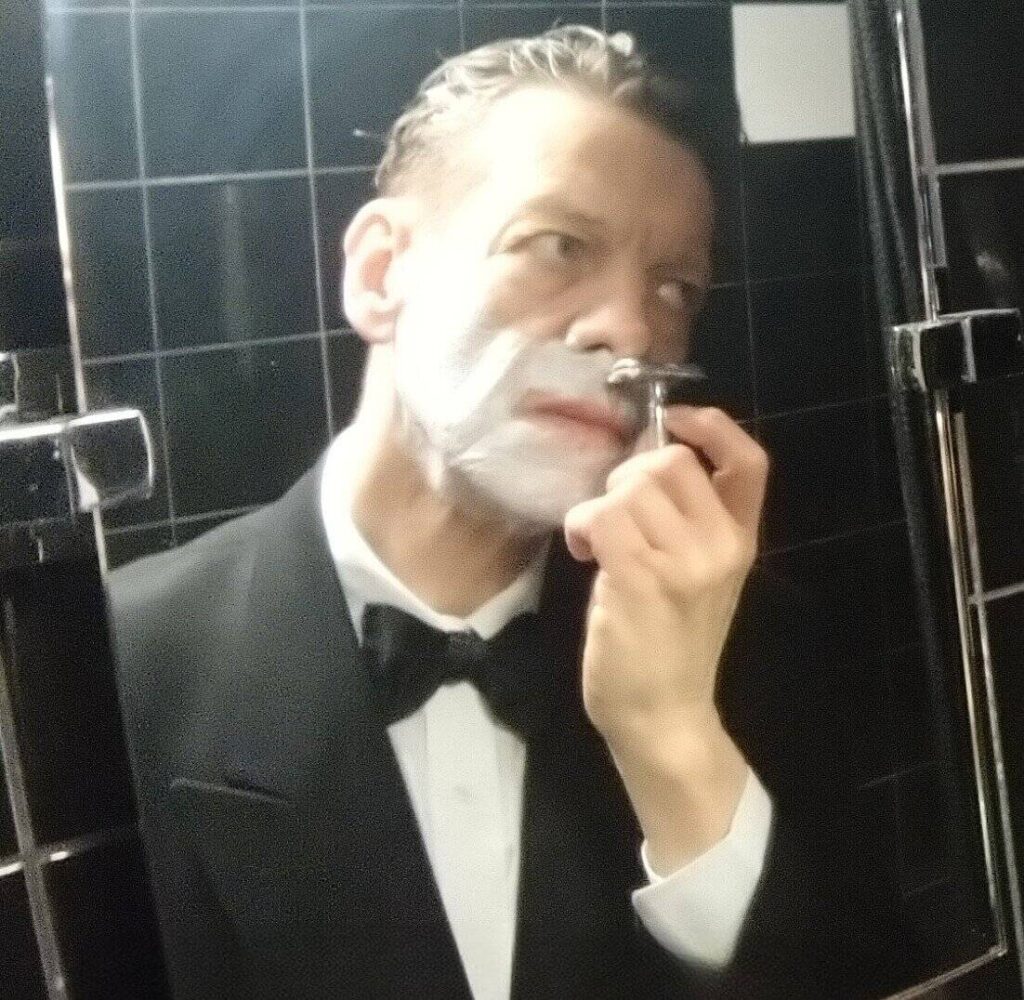
Michael Warren’s Mariocki isn’t just an album, it’s an opulent fever dream dipped in Cold War spy noir, lounge croonery, and mid-century pulp surrealism. A pop bricolage that marries Brechtian character studies with Danger Man motifs and a crooner’s restraint (imagined as Andy Williams haunted by Bowie’s ghost), it saunters past pastiche and into something much stranger. In this interview, Warren dishes on torch songs, concept-album misdirection, and the kind of villainy that wears cufflinks. He’s equal parts raconteur, romantic, and showman, but never quite what you expect.
Mariocki feels like an album from a world just slightly askew, where lounge elegance and cinematic drama swirl together in a surrealist cocktail. When assembling it, did you see your music as a kind of pop collage, or were you secretly crafting a concept album disguised as a long lost mixtape?
I am influenced in my choices of tracks equally as much by my favourite TV and comic books, as I am by music itself. An obvious example of this is, ‘You’re The One For Me’, which was originally performed by a torch singer in an episode of Danger Man. It was such an exciting opportunity for me to recreate this. Totally self-indulgent, but I couldn’t resist it. Very often I will consider one of my own songs as existing in a 3D environment, or as source music. I can easily hear ‘Didja?’, for instance, being played in the dormitories of the X-Men, and see quite clearly, Napoleon Solo dancing to ‘Come, Guinevere’ with his date in a Manhattan nightclub.
During the recording of Untold Tales, it occurred to me that we could go happily on forever, with album after album of originals, and treasured covers that I’ve performed live, but never recorded. Mariocki is the second of these.
You open with ‘What Caspar Did’, described as “neo-Brechtian” and influenced by The Man Who Sold the World. Are you tapping into Bowie’s outsider theatrics, or are we talking full-on cabaret villainy?
“Cabaret villainy”. I like it. Yes, that will do nicely! Casper is a composite of a type of thug who frequented certain nite-spots in York, back in the day. He is the proud King of the gutter. He’s made some poor life choices, and makes a particularly bad one here.
I certainly understand how one might see The Man Who Sold The World, in Casper, but if I were to link it to any Bowie album, at least in terms of theme, it would probably be his first.
Your rendition of ‘Lady Grinning Soul’, strips back the song. What’s the trickiest part about reinventing someone else’s work, respecting the original, or knowing when to ignore it?
I always thought that Andy Williams would have done a wonderful version of this song, although I dare say his management, and the larger sections of his fan-base, would have disagreed, given the subject matter. I imagined an Andy Williams vocal template for this, and performed from that, so there is indeed a reverent nod, but it is to Williams.
Particularly since Bowie’s death, I’d witnessed the dramatic intro of the song being received with a closed-eyed solemnity, which doesn’t sit well with me at all. This is why our version starts where it does. One bar, and we’re off. I had no qualms at all about this, as it was just realigning the song to suit us. Bowie was the absolute master of reinvention, which certainly made the change easier to take.

‘The Norman Way Theme’ echoes classic spy themes. How deep does your love for lost British spy TV go, and why do you think this aesthetic still resonates?
Certain productions from the ITC stable of adventure series from the 1960s, along with the Emma Peel episodes of The Avengers, and The Man From U.N.C.L.E., are at the very heart of all things I love within the realm of the moving image. Nothing surpasses the period from Danger Man in 1960, through to the closing episodes of The Saint in 1969.
When I hear spirited debate after a weekend’s TV viewing, concerning the relative merits of the ballroom dancing skills of a newsreader and a rugby player, for example, I’m not sure there’s much to interest me on TV at the moment. The TV I enjoy is not a bolthole from today, but is deserving of its own classification of style in the pantheon of Cinema and TV history.
‘Norman Way Theme,’ is certainly influenced by Edwin Astley and Ron Grainer, and their themes for ITC, and I wouldn’t deny that it is a pastiche of the period.
Your baritone voice has been compared to classic crooners, yet your arrangements often subvert the lounge tradition. Is that contrast intentional, or do you just have a soft spot for unsettling elegance?
It’s actually an amalgam of two professional lessons I learned early on: Know your limits, and, find your own vocal identity within those limits. To strive to emulate your idols is natural and fine, but it would have been naïve in the extreme to think I could even come close to possessing Nat King Cole’s intimacy with the microphone, the sheer physicality of Tom Jones’s vocals, and the grace and fluidity of Andy Williams, so anything I perceive as a shortfall is filled by me, just being me. This comes as second nature now.
Musical Director, James Stringer, knows my voice well, and arranges the music accordingly. Keiron Phelan (Producer), Ian Button (GDN Supremo), and Giles Barrett (Sound Recorder), are always alert to where I stand at any time within a piece, and will offer comment accordingly. I trust their judgement implicitly.
You’re a character in a novel, a real-life singer, and a casino croupier on indefinite leave. Which of these identities informs your music the most, or is the trick in never letting them settle?
Being a croupier was a means to an end, and it took me all over the world, allowing me to see the weird and the wonderful, the beauteous and the ugly, of the planet at first hand. These experiences didn’t quite prepare me, though, for the singular surprise of finding a fictionalized me in a novel. And what a fine novel it is!
My singing has allowed me to articulate in music these thoughts and experiences, and has, perhaps, subjugated them. The croupier is gone, the fictionalsed me is beyond my control, but I hope the singer will continue to express. The singer takes it!
As a former croupier, let’s play one last hand. If you had to bet everything on one song from your career being rediscovered in 50 years, which one would it be?
‘Norman Way Theme.’ I’ve written a Norman Way graphic novel, and live in hope that I might find an illustrator for it. When this is published, there will, of course, be the blockbuster movie, and hugely successful TV series’ in the 60’s ITC tradition. In 50 years, ‘The Norman Way Theme’ will be dusted off, and recognized as the starting point. I could be bluffing, of course…




